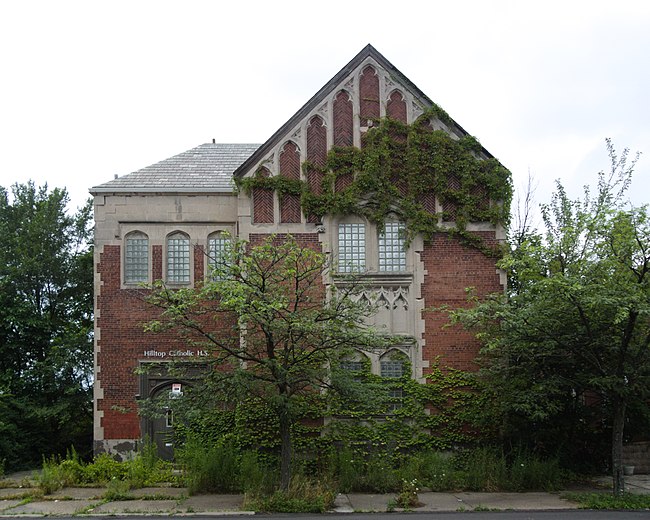

This is the old St. Canice’s school in the Knoxville neighborhood of Pittsburgh. It has seen better days.

The entrance to SS. Peter and Paul Church in the East Liberty section of Pittsburgh. This picture is not up to date: if it were up to date, it would include the blue CONDEMNATION stickers on the doors.
In many ways, the Roman Catholic Church is the worst slumlord in Pittsburgh, and the same is true in most other large cities in the United States.(1) When a building is no longer useful, the popish church cannot maintain it, because money is limited, and membership is dwindling (in some of our American cities—the papists as a whole are going great guns), and maintenance costs are huge. If only there were some way to keep these buildings up for free! Then they would be available for parishioners’ weddings or birthday parties or Amway presentations or whatever, and they would not be hideous scabs on their neighborhoods.
Well, Dr. Boli is about to explain how the Roman Church could solve this problem, and the idea is so simple it can be explained in one word:
Indulgences.
Think about it for a moment. The Catholic Church used to be fabulously good at selling indulgences. It was so good at it, in fact, that the success of the indulgences business spawned the whole Protestant movement. And what did all that money go to? The building fund! And what did the world get for its money? St. Peter’s Basilica! Any way you look at it, that was a good investment.
So is Dr. Boli really advocating selling indulgences again? By no means. The sale of indulgences created a scandal, and the Roman Catholic Church does not need a scandal. Here is what the good old Catholic Encyclopedia (under Indulgences) says about the matter:
Here, as in so many other matters, the love of money was the chief root of the evil: indulgences were employed by mercenary ecclesiastics as a means of pecuniary gain. Leaving the details concerning this traffic to a subsequent article (see REFORMATION), it may suffice for the present to note that the doctrine itself has no natural or necessary connection with pecuniary profit, as is evident from the fact that the abundant indulgences of the present day are free from this evil association: the only conditions required are the saying of certain prayers or the performance of some good work or some practice of piety.
Some good work! That is what Dr. Boli has in mind. The average Catholic parish in the United States has about three thousand members. Let us say that only a third of them are active in any meaningful way. Among a thousand parishioners, there are bound to be several carpenters, roofers, HVAC contractors, architects, and so forth. And anybody can pick up a paintbrush. As for the materials, it’s surprising how little they cost if a bunch of volunteers who plan to work with them split the cost. Perhaps people could be encouraged to give up Starbucks for Lent and divert their latte money to materials costs.
Parishes struggle to find meaningful activities to get the members involved. Well, here’s a meaningful activity for you: this weekend, let’s all go fix up the old convent! What will you get out of it? Take a look at this indulgence! Dr. Boli’s old copy of the Douay Bible offers an indulgence of three years for spending fifteen minutes a day reading Scripture. Think of the indulgence you could earn by replacing a few joists—and in the process getting to know Jesus better by actually practicing his profession!
Meaningful labor, meaningful piety, genuine good accomplished in the world—that is what this program has to offer, and Dr. Boli hands it over gratis to the United States Conference of Catholic Bishops, without even demanding an indulgence for himself. The grateful prayers of intercession from the people who live in the neighborhoods where these buildings fester will be enough for him.
Footnotes
- We should note that two of these buildings were sold at fire-sale prices, and therefore it is the new owners’ fault, technically, that they are not kept up. But it is a predictable pattern that the Catholic Diocese abandons a building, and then it becomes a blister in its neighborhood. (↩)